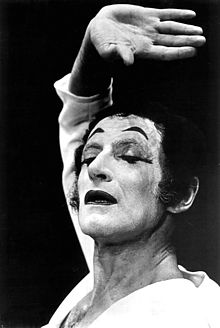Marcel Marceau
| Marcel Marceau | |
|---|---|

Marceau in 1971
|
|
| Born |
Marcel Mangel 22 March 1923 Strasbourg, France |
| Died | 22 September 2007 (aged 84) Cahors, Lot, France |
| Resting place | Père Lachaise Cemetery |
| Other names | "Le mime Marceau" |
| Alma mater | Charles Dullin's School of Dramatic Art |
| Occupation | Actor, mime artist |
| Known for | Bip the Clown |
| Spouse(s) | Anne Sicco (1975–2007) Ella Jaroszewicz (m. 1966) Huguette Mallette (div. 1958) |
| Children | 4 |
Marcel Marceau (French pronunciation: [maʁsɛl maʁso]; born Marcel Mangel, 22 March 1923 – 22 September 2007) was a French actor and mime most famous for his stage persona as "Bip the Clown". He referred to mime as the "art of silence", and he performed professionally worldwide for over 60 years. As a youth, he lived in hiding and worked with the French Resistance during most of World War II, giving his first major performance to 3000 troops after the liberation of Paris in August 1944. Following the war, he studied dramatic art and mime in Paris.
In 1959 he established his own pantomime school in Paris, and subsequently set up the Marceau Foundation to promote the art in the U.S. Among his various awards and honours, he was made "Grand Officier de la Légion d'Honneur" (1998) and was awarded the National Order of Merit (1998) in France. He won the Emmy Award for his work on television, was elected member of the Academy of Fine Arts in Berlin, and was declared a "National treasure" in Japan. He was friends with Michael Jackson for nearly 20 years, and Jackson said he would use some of Marceau's techniques in his own dance steps.
He was born Marcel Mangel in Strasbourg, France, to a Jewish family. His parents were Ann Werzberg and Charles Mangel, a kosher butcher. When Marcel was four years old, the family moved to Lille, but they later returned to Strasbourg. When France entered World War II, Marcel, 16, fled with his family to Limoges. In 1944 Marcel's father was captured and deported to the notorious Auschwitz concentration camp, where he was killed. Marcel's mother survived.
Marcel and his younger brother, Alain, adopted the last name "Marceau" during the German occupation of France; the name was chosen as a reference to François Séverin Marceau-Desgraviers, a general of the French Revolution. The two brothers joined the French Resistance in Limoges, where they saved numerous children from the race laws and concentration camps, and, after the liberation of Paris, joined the French army. Owing to Marcel's excellent command of the English, French, and German languages, he worked as a liaison officer with General George Patton's army.
...
Wikipedia
